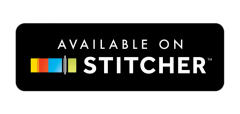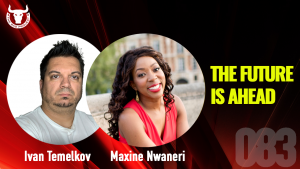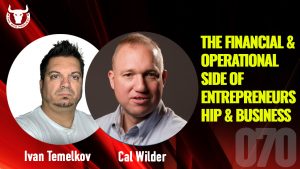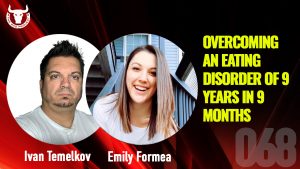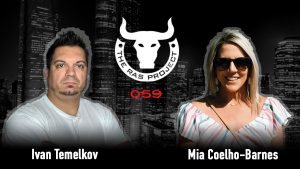Is Satisfaction Also Happiness? | The RAS Project 056
Being tech-savvy has its perks. You see the world from a whole different perspective. In this episode, I sat down to chat with Will Zhang. He is the CEO of Fintelics, an advanced technology consulting & solution development company. Will has many accomplishments and also very well deserved that led him to start Fintelics.
Will worked for IBM. A 30 under 30 developer ranked in Canada and also awarded a fellowship by Founder Institute (One of the best pre-accelerators in the world). During his time at Fintelics, the company won “Leading Experts in Omnichannel Software” and “Best Custom Fintech Consultancy in Ontario” awarded by Wealth and Finance International.
The RAS Project is available on Apple Podcasts, Google Podcasts, Spotify, and iHeartRadio. You can also watch in video on my YouTube channel and Facebook Watch.
- Apple Podcasts – https://ivnt.io/ras-on-apple-podcasts
- Google Podcasts – https://ivnt.io/ras-on-google-play
- Spotify – https://ivnt.io/ras-on-spotify
- iHeartRadio – https://ivnt.io/ras-on-iheartradio
Ivan Temelkov [00:15]
What’s up everyone, you’re listening to The RAS Project. My name is Ivan Temelkov. I’m your host. On this podcast we discuss entrepreneurship, personal development, family tech and marketing. Why should you listen to this podcast? This podcast is for those of you who are looking for life changing advice, and ways to thrive digital with your business. As always, all content is 100% real raw and unfiltered. We’re excited today to have another guest on the podcast. His name is Will Zhang, and he is the founder and CEO of Fintelics.
Fintelics is an advanced technology consulting and solution development company prior to that will work for IBM then became the CTO of Stafits. Will provided IT consulting services doing cloud architecture computing data engineering for many large enterprises during his time at Intel x the company one leading experts in omni channel software and the best custom FinTech consultancy in Ontario, awarded by wealth and finance international.
Will was Canada “developer 30 under 30 winner” in 2019, and awarded fellowship by founder Institute, one of the best free accelerators in the world. Will was invited by IBM, Casco, and IEEE to present the academic speech of blockchain and cloud computing. Specializes in software engineering, omni channel app development, DevOps cloud computing, big data blockchain machine learning. Will! Welcome to the show!
Will Zhang [01:54]
Thank you so much for having me. It is an honor and honorable pleasure.
Ivan Temelkov [02:00]
Absolutely. So I was I was reading through your bio, I’m like, holy shit, man, like this guy is all kinds of technology stuff. You know, this is amazing. I mean, you’ve done some amazing things. And as a fellow tech guy, I mean, I dropped my head off to you, man, because these are just some amazing accomplishments that you have here. I’m so happy for you that you’ve been able to do these things. You don’t like it so much. Yeah, your hide is still on though. Well, it is still on because you won’t like what’s underneath it. Okay. He’s not wearing that hat is as we all know, we are a midst of a quarantine. Let’s face it. It doesn’t look like by the looks of things that I haircut place is gonna open up anytime soon lower.
Will Zhang [02:47]
I feel the same way. My hair is really really loud right now. Yeah.
Ivan Temelkov [02:51]
So but yeah, you get. You get the gist. You know, I applaud you for your accomplishments, you know 30 under 30. You’ve done some amazing things. Work with IBM. I mean, this is a globally renowned company. So let’s talk about, you know, what happened before Fantasticks. Right. So before you became the founder and CEO of Intel, let’s go a little bit way back to like your childhood and talk a lot about like, the early days like, were you always entrepreneurial? Did you always?
Will Zhang [03:24]
Yeah, I mean, I’ve always been passionate about doing my own thing and try to kind of explore and push myself. Before I even graduate from university, I kind of started my own consultancy at the time and using some of the traditional little bit more traditional type of technology like for instance, PHP or you know, some traditional framework for WordPress to build websites.
Will Zhang [03:49]
But as I you know, grow grew older I wanted to work for a big company. IBM was kind of my dream company because the mental, a lot of cool stuff. SQL, power computing. IBM was like my dream company. But after I, you know, had my experience at IBM, I realized this big company is great, you can get to learn a lot of stuff, you get to meet a lot of, you know, brilliant people.
But it just, it wasn’t for me to be essentially devoting my career solely on one enterprise. So, so then, I started working for startups. And then once the product hits the production, that’s when the development stops. That’s when I feel like, Oh, this is kind of not what I’m looking for. I’m more interested in constantly adapting and evolving, learning about new technology.
And so that’s kind of what what what kicked off the idea of building a company of building Fintelics and was fortunate enough to meet a group of like minded people. And you know, who ended up working for a company that I built. And so far we’ve been doing great as medicine doing sharing pretty well. For a startup. Obviously, this is just the beginning. We still got a long way to go.
Ivan Temelkov [05:23]
Very cool. Very cool. Well, the reason I was asking, you know, those questions is because, as you were kind of mentioning about your experience with IBM, it really got me thinking to, you know, some of my earlier days is being swayed by these big brands, because, like you said, IBM was your dream company, right? And so for as long as you could remember, you want to be a part of a big movement, and let’s face it, companies like IBM have, indeed, you know, created some of the best technologies out there in the world or even utilize to this day.
Now. I think the missing component of that, you know, as as entrepreneurs is just that it’s not our own thing. It’s not our labor of love. It’s not our own creation. And us entrepreneurs are really passionate about creating something investing in something that we know is going to have a positive impact in the world, you know, help other businesses help people, you know, create positivity in the world. And so I think that’s where when we were talking about, you know, having worked for IBM, it really just got me thinking and reflecting that I think a lot of people, a lot of entrepreneurs in their earlier days because we all work for some companies at some point or another.
And we all felt very passionate and very driven. We felt like we could create a difference, right, make a difference within those companies. But like you said, there’s a point in your life that you come to that you realize that you know what, this is not my vision. This is not my dream, you know, this is not what I wanted to create. The beauty about that I admire the most about people like you is this that entrepreneurs are the backbone of economies.
We create jobs, you know, we create innovation. I’m thinking of guys like Elon Musk and Tesla, and SpaceX. You know, he has completely revolutionized the automotive industry. And he has done it in such a short period of time. And the automotive industry was kind of like, I guess, on an autopilot for decades and decades thinking that, you know what, we’ll just keep doing the same shit. Nobody’s gonna pass this up. Nobody’s coming out with anything innovative.
And then Elon Musk comes in and suddenly, Tesla and all these big automotive makers like, you know, GM, for instance, being one of the biggest ones in the world is like, holy shit. We have to revive our approach to compete with companies like Tesla, so suddenly the underdog right behind Comes the leader and the innovator in a very saturated, very competitive industry.
So let’s talk and let’s talk a little bit about, you know, so what are you guys doing specifically, that you believe is separating you from the rest of the industry in itself? What are you doing that’s innovating. That’s, you know, that’s that’s very forefront thinking with your business and how is that impacting the business world?
Will Zhang [08:31]
Sure. So yeah, exactly. As you mentioned, I feel like the traditional approach of for IT professional to join a big company and, you know, just move up the corporate ladder slowly. That’s not that’s, don’t get me wrong, that’s, that’s perfectly fine. That’s sometimes a great thing to do if you are, you know, if you want to just focus on self development, and if you just want to.
You know, constantly improve yourself working or test skills. But for me, what really motivated me to make the jump is is the idea of being a human or building something on your own. And some you can take an idea and complete completely actualize it in real life. That’s what really got me into into making this shift in my life. So in terms of our companies actually, if you think about it, it’s a very traditional business model, you’re doing software development you’re doing consulting, are essentially a third party implementation for doing research and development.
But what we want to focus on is we want to focus on developing the best practice and adopting emerging technology and newest technical technical stack, because that’s the essence of entrepreneurship. That’s right to experiment and try out new things right? There are a legacy system and technology we know for sure will work. However, by working with existing technology, you will never become the alpha in the market. Right?
You will never right be able to taste the fruits of experimentation, the fruit of innovation, right. So, right. So and that’s kind of what we want to, you know, align ourselves with. We adopt like a lot of cloud computing, cutting edge, best practice. And we’re very focused on developing the best practice and try to discover what’s the standard and how can we improve that and go one step further on creating something that is 100 drive more value to the business, that easy to maintain.
That helps with you know, advanced analytics, whether it’s like collecting data, analyze data, there’s always room for improvement ratio became the edible asset. Bass, our consulting partner, and we’re working very closely with the biggest cloud provider AWS to to try to develop the best hardware solutions. Yeah. Yeah. A couple
Ivan Temelkov [11:13]
of things that you couple of things that you mentioned, that I just wanted to touch upon is you mentioned innovation and disruption. And I think these are key elements to highlight honest because companies, the companies of tomorrow are the ones that are innovative and disruptive. They’re the companies that are going to take ownership and take away market share from a lot of the traditional companies today.
We have seen that happen with companies like Tesla companies like Space X, right? Elon Musk’s companies, and we’ve seen it with in other industries, as well not not just you know, with the automotive industry is using an example. So, when you were talking about innovation and disruption. Personally, I’m huge believer in that you’re also talking about experimentation. Experimentation is essential in any industry, because that is the only way in part that you experience you test.
And you also identify what works and what doesn’t. In fact, experimentation is an essential component in any industry in any vertical. But I think the reason you talked about this and why I wanted to touch upon it is because I think a lot of companies refrain from experimentation, because experimentation is commonly seen as a costly endeavor.
It can cost money, it can cause time, and he does not have a definitive outcome, right? experimentation is just a giant puzzle, Mark. So, you know, you were talking about data, you were talking about software and applications, right? Well, there’s no actual determination that when you’re experimenting with something that’s going to come to fruition, but that’s why you experiment in tetra so you can find out what works and what doesn’t?
Will Zhang [13:02]
Yeah. So I think with the modern-day technology evolved, evolved, the cost of, you know, experiments doing research and development is being less and less. So it’s becoming less and less. So if you’re smart about experimentation, experimenting and building out your own idea. And you’re able to do that quickly. And in a cost effective manner, you’re able to set yourself from your competitors.
So, and if you don’t, if you’re not willing to do that you’re gonna fall behind doesn’t matter what sector you’re in real estate, finance, whatever, if you’re not aligning yourself with automation or just the self motivate your own organization to align yourself to, to you know, innovate quick, quickly. It’s very easy for you to fall behind.
Ivan Temelkov [13:56]
Absolutely. You know, one question that I wanted to ask you while we’re on this topic, So as you’re disrupting and innovating, which by the way, like I said, I’m a huge fan of leaping forward, being an early adopter of many things. Who are some of the what is your target audience? What is your buyer persona? What are some of the brands and companies that you’re trying to align to, you know, to introduce this new disruptive and innovative technology that you’ve been working on?
Will Zhang [14:25]
Well, actually, our clients are a decent chunk of our clients are startups, VC backed startups, that are heavily relied on technology, as you would probably imagine, you know, companies that are more of like a medium sized or, or traditional, you know, sector, they probably are looking for something that’s more stable, whereas startups can really get the ROI or the benefit of innovating and experimenting with new things because they had nothing to begin with.
Right. So, by by doing so, you know a lot of our clients have done a tremendous amount of ROI based on their initial investment on building a particular product, whether whether it’s blockchain human resource related, you know, education, online education spans across different sector automotive. We have clients also in you know, in sports. So, that’s essentially the justice is startups that are looking to leverage technology to the fullest.
Okay. And the other kind of the opposite end of the spectrum is the enterprise or bigger company, Fortune 500 companies that have a research and development initiative. In that case is usually bring on consultant one by one, like they pick a particular consultant with a specific set of skills the bring them on board. As a dedicated consultant because they have a lot of money, let’s face it, they have a lot of money, a lot of funding and resources.
And they they are they have the additional resources to do the research and innovation. Yeah, yeah. What we find is that there’s the startup and the enterprise. And in the middle, the, you know, the medium-sized businesses are a little bit tricky. And they’re there. They have their own IT department, but they’re not looking to innovate.
Ivan Temelkov [16:26]
Sure. Yeah. That’s a really good point. And something that you mentioned I wanted to touch upon is, the beauty about you being a startup is that you your response time is a lot quicker as a as a startup, meaning that in a lot of larger enterprises, like we talked about is from an operation standpoint, there’s too many chains of command specifically, when it comes to it and technology, which means that that delays, the time of approval delays, the time for implementation, execution, and even then, even get into quality assurance, right?
So I think one of the beauties about a startup like like Fintelics is that you are a lot more responsive. Your implementation execution, it time is a lot shorter, which means that you can respond to some of these bigger enterprise companies. The beauty about that is, like you said, enterprise companies have a much bigger cash flow, which means that you can tap into that. So suddenly, you become the underdog that’s more responsive, innovative, disruptive day like that, because the traditional approach is slowly fading.
And they have the cash flow, not to mention is that in most cases, you’re probably cheaper than the closest competitor because the next competitor might charge 10 2030, or even 40% higher, and enterprises are looking at it from a cost efficiency standpoint, can I bring a more disruptive, more innovative startup to help us with it and technology and applications, and by the way, they’re not going to break the bank.
So I think the way you’ve in the reason I asked the question about target audience and buyer personas to understand who you are targeting, who you’re working with, who’s your ideal client, and how you’re helping them, you know, with the solutions that you provide. So, what’s next for fantastics? I mean, what have you been focusing on in 2020? And what do you want to do beyond?
Will Zhang [18:24]
Yeah, so, previously, our focus has been maybe serving our existing clients recently, in about last year or so we started initiative to incubate our own product and develop our own solutions that is easier to scale. And are one of our principal has always been, you know, focusing on people. Because what is what is kind of like I’m very passionate about finance. Aside from technology. What is the intrinsic value of a tech technology firm is the people as a tech profession.
All right, right there, the people who was doing the groundwork, the other people who’s doing all the heavy duty, you know, the heavy lifting, innovating, innovating and creating value for the economy. So, we really try to align our interests as much as we can, with our employees, with our, with our team members. We treat everyone with respect and we want to make sure that they learn new skill set every once in a while. So, we develop a lot of technology, such as a knowledge sharing platform, and also like a documentation mechanism to document you know, technical solutions.
So that so that our team can quickly learn and pick up a skillset from each other. And we developed some structure called technology talent supply, technology, talent, career path, in which we summarizes the four phases of attack talent will be where they you know, actually Get into the industry when they just graduated, they have this gap between, you know what, you know what you’ve learned in school versus what the industry really needs.
Right? We’ve all experienced that. That’s beyond. Right. Right. So we try to we try to educate them, and sort of provide training services at that stage. And then later when we assimilate them into our team, pick out the people who are really passionate about technology, and bring them on board into the project team and building solutions for startups.
For our clients that are that are more for startups. As they develop more professional experience them off to the next phase, which then they might be deployed on to a new enterprise as a dedicated consultant because by then they have a tremendous amount of product experience and they also have a decent amount of leadership and communication skill sets. So an afterword if they are really ambitious, we sort of Make them one of our partners and have them leading either their own practice or leading our own startup, we provide all the other necessary resources and connections that we can gather.
And we try to develop solutions, our own, you know, the founder Institute fellowship was really awarded to work as a product that was that was developed by us and we will try to create a spin off called a company wizard, which is the accounting automation tool. And the dollar sharing platform is called savant so and it will be released very soon, so stay tuned for that as well.
Ivan Temelkov [21:35]
Awesome. Yeah, awesome. Well, I’m very excited about everything that you guys are doing sounds like you know, you’re growing, you’re introducing new ideas, you packaging, you know, your product. You’re doing all kinds of great things and what I before we close things off, you know, can you tell the audience you know, how can people find you out there, what’s the best way to connect with you? They’re all on social handles.
Will Zhang [22:00]
Sure, you can find us on LinkedIn. That’s where we’re most active. On Instagram. And also you can just go on our website or email us at info@fintelics.com
Ivan Temelkov [22:14]
Okay, awesome. I love the t-shirt by the way. I like the up arrow that’s really creative. So well thank you so much for your time man. I really appreciated the conversation. Thank you so much for taking the time to share a little bit about your company. I’m very excited about all the things that you guys are doing congratulations and hoping that 2020 is fruitful for you.





